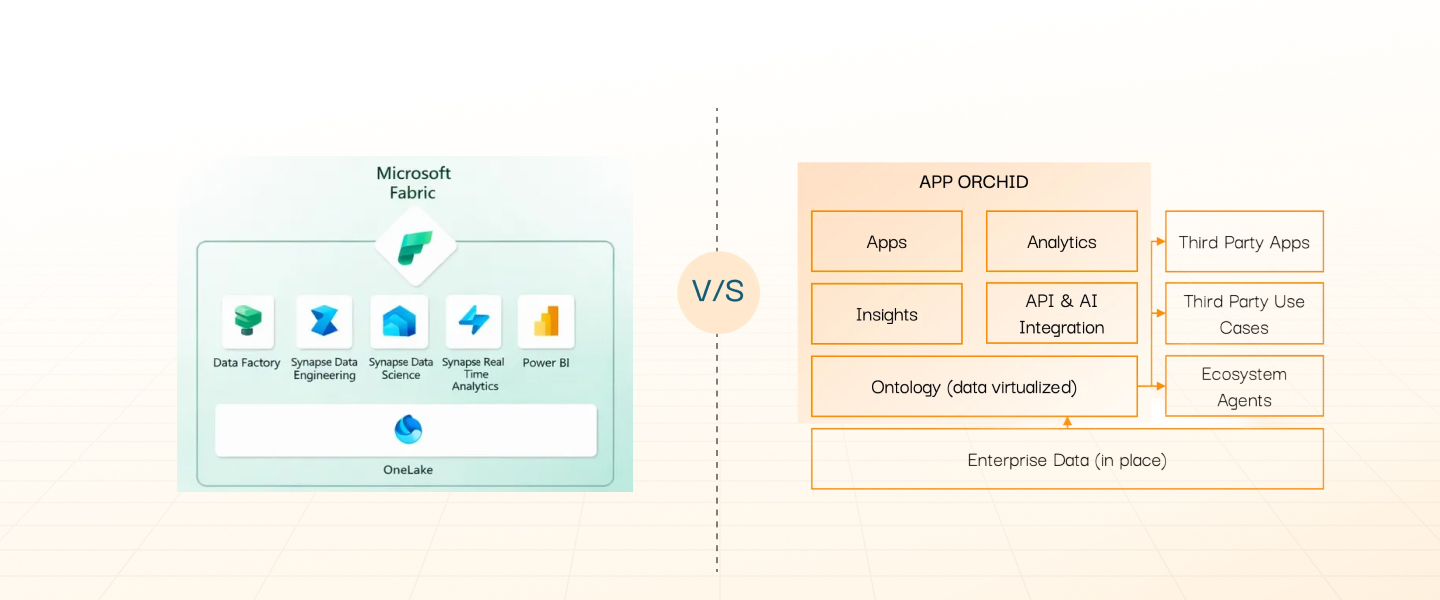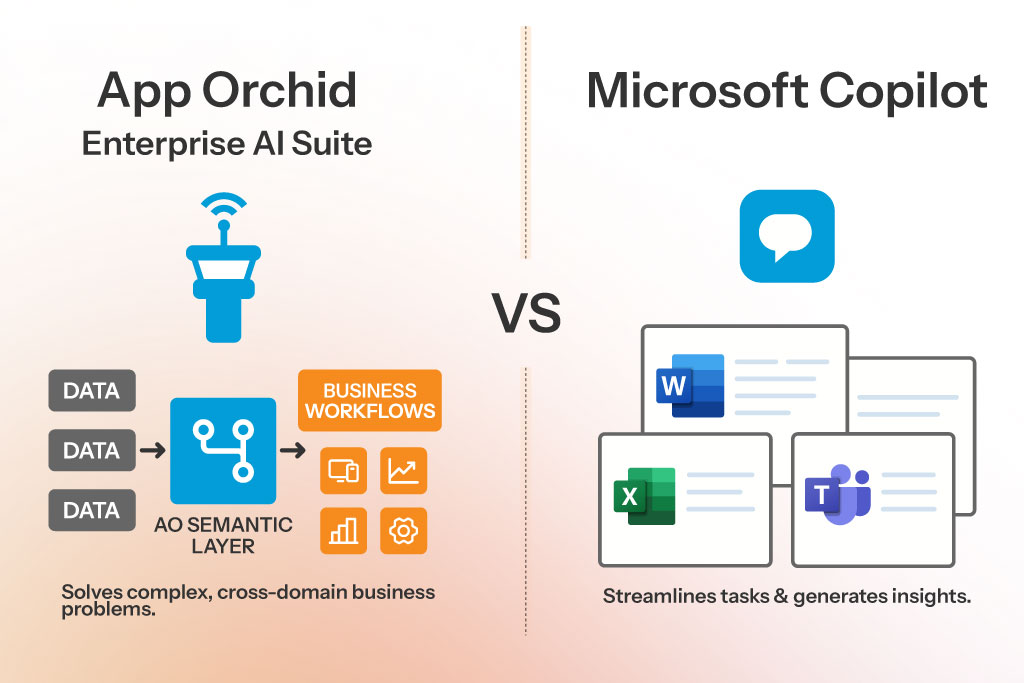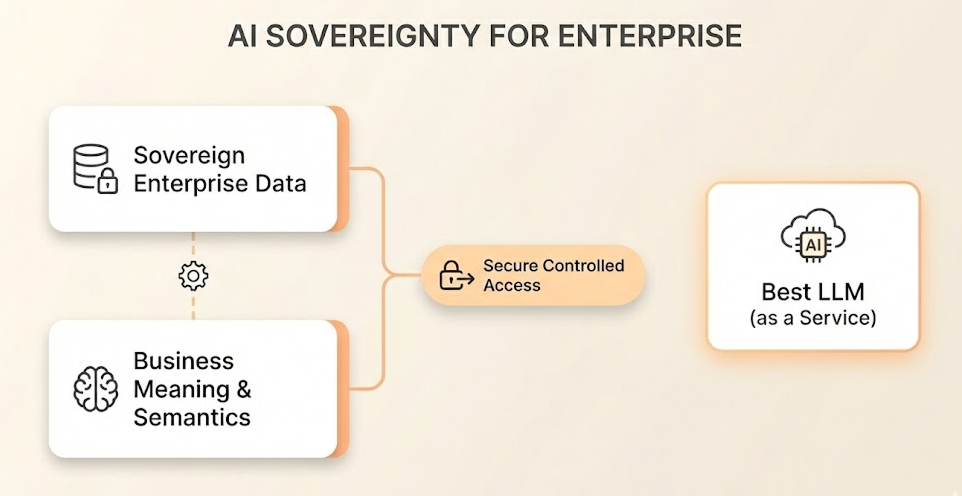
App Orchid's Enterprise AI Suite vs. Microsoft CoPilot

A Comparative Analysis for the Modern Enterprise
The rapid proliferation of Generative AI has introduced a new class of tools promising to revolutionize enterprise productivity and data interaction. Microsoft CoPilot, a powerful AI assistant integrated across the Microsoft 365 and Fabric ecosystems, is at the forefront of this wave. However, enterprises evaluating their AI strategy often require more than a productivity layer; they need a robust, specialized platform capable of untangling complex, federated data landscapes to drive core business decisions.
This is where App Orchid’s AI suite—built on the foundational App Orchid's Semantic Knowledge Graph—provides a distinct and purpose-built solution.
This post will demonstrate that:
- Microsoft CoPilot is an exceptional general-purpose productivity and business intelligence assistant designed to work within the Microsoft ecosystem. It streamlines tasks and generates insights from well-defined data sets.
- The App Orchid suite is a comprehensive enterprise AI insights & analytics platform, architected to solve complex, cross-domain business problems by first building a rich, virtual, and federated understanding of an organization's entire data estate.
While they may appear to overlap in their use of natural language, but their core architecture, depth of analysis, and ideal use cases are fundamentally different. Furthermore, they can be powerfully complementary, with App Orchid providing the deep intelligence and CoPilot serving as a "last mile" consumption and communication tool.
1. Core Philosophical and Architectural Differences
The primary distinction lies not in the features but in the foundational approach to data.
2. Feature Capability Comparison
3. Use Case Comparison: Where Each Platform Shines
App Orchid is the Ideal Choice for:
- Complex, Cross-Domain Analysis: Answering questions that require seamlessly joining data from ERP, CRM, SCM, and financial systems. Example: "Identify all customers with service tickets open for more than 30 days who are up for contract renewal in the next quarter and have a declining product usage pattern."
- High-Stakes Enterprise Operations: Asset performance management, supply chain risk analysis, predictive maintenance, and complex financial modeling where understanding the deep relationships between entities is critical.
- Democratizing Deep Analytics: Empowering business analysts to perform causal analysis or run forecasts without needing to be data scientists, thanks to Quick Insights.
- Organizations with Data Sprawl: Companies struggling with multiple data warehouses, lakes, and legacy systems who need a virtual, unified layer for analytics without undertaking a massive data migration project.
Microsoft CoPilot is the Ideal Choice for:
- Business User Productivity: Empowering a marketing manager to quickly create a chart of campaign performance for a weekly presentation, using data from a pre-built marketing dashboard in Power BI.
- In-the-Flow BI: Allowing a sales manager in Microsoft Teams to ask, "What were my team's sales figures for last week?" and get a quick summary.
- Report Authoring Assistance: Helping a BI developer write complex DAX measures or generate a starting point for a new Power BI report.
- Content Generation: Using CoPilot for M365 to summarize the findings from a Power BI report into an email or a PowerPoint presentation.
- Rapid Prototyping: Excels at doing quick POC, but fails to deliver Production quality
4. Complementary Synergies: Better Together
An enterprise AI strategy is not an "either/or" decision. App Orchid and Microsoft CoPilot can create a powerful synergy.
Scenario 1: App Orchid as the "System of Intelligence," CoPilot as the "System of Engagement"
- Foundation: App Orchid connects to the enterprise's disparate data sources and builds the comprehensive Semantic Knowledge Graph. This becomes the certified, governed "single source of truth."
- Deep Analysis: Business analysts use App Orchid's conversational analysts solution Easy Answers and Quick Insights to uncover deep, causal relationships, detect anomalies, and generate forecasts.
- Curation & Export: The validated and curated data resulting from this analysis (e.g., a list of high-risk customers) is materialized and exposed as a clean, trusted Power BI dataset.
- Last-Mile Consumption: A business user, who may not need the full analytical power of App Orchid, can now use Microsoft CoPilot in Power BI or Excel to interact with this pre-digested, certified dataset for their day-to-day reporting and summarization tasks, confident that the underlying data is accurate.
Scenario 2: Accelerating Communication
An analyst uses App Orchid's Quick Insights to discover a critical anomaly in production line efficiency. They use Easy Answers to create a full dashboard explaining the issue. They can then take a screenshot or export the key findings and use CoPilot for Microsoft 365 to instantly draft a priority email to the operations team, summarizing the problem and linking to the App Orchid dashboard for detailed exploration.
Conclusion
Choosing between App Orchid and Microsoft CoPilot is not about choosing a better natural language engine; it's about choosing the right architecture for the job at hand.
- Microsoft CoPilot is a horizontal AI assistant that lowers the barrier to entry for basic BI and enhances productivity within the Microsoft ecosystem. It is an invaluable tool for the modern information worker.
- The App Orchid Suite is a vertical, enterprise-grade AI analytics platform designed for depth, complexity, and trust. Its foundational Semantic Knowledge Graph provides the robust, federated, and semantically-aware context necessary to answer the mission-critical questions that drive a business forward.
For enterprises looking to move beyond simple data queries and unlock true, cross-functional intelligence from their complex data estates, App Orchid provides the foundational brainpower, while CoPilot can serve as an effective interface for consuming and communicating those powerful insights.
Discover how App Orchid can help your operations today.


The Best Path to
AI-Ready Data
Experience a future where data and employees interact seamlessly, with App Orchid.

